Addiction: Choice vs. Disease - A Rogerian Argumentative Essay
VerifiedAdded on 2023/05/30
|6
|1590
|132
Essay
AI Summary
This essay examines the contentious debate of whether addiction is a disease or a choice, employing a Rogerian argumentative approach to support the thesis that addiction is fundamentally a choice. It critiques the disease model of addiction, challenging the notion that brain alterations equate to a disease state. The essay argues that behavioral changes in addicts, driven by personal choices and intentions, contradict the disease model. It highlights the role of neuroplasticity in brain changes and emphasizes that individuals can modify addictive behaviors without medical intervention. The essay concludes that framing addiction as a disease overlooks the individual's agency and intention, instead characterizing it as a deeply ingrained habit rooted in the biology of desire, accessible on Desklib for further study and exploration of related academic resources.
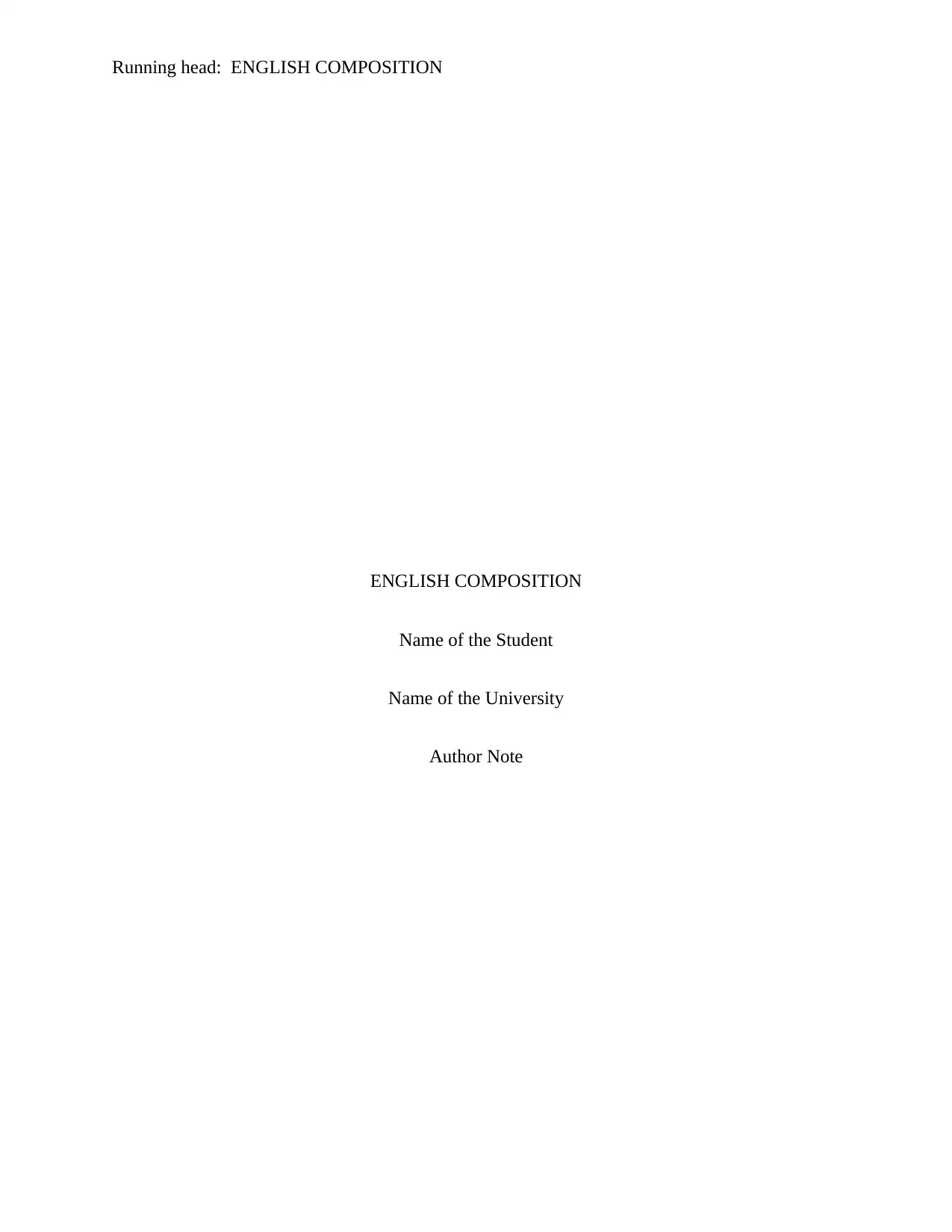
Running head: ENGLISH COMPOSITION
ENGLISH COMPOSITION
Name of the Student
Name of the University
Author Note
ENGLISH COMPOSITION
Name of the Student
Name of the University
Author Note
Paraphrase This Document
Need a fresh take? Get an instant paraphrase of this document with our AI Paraphraser
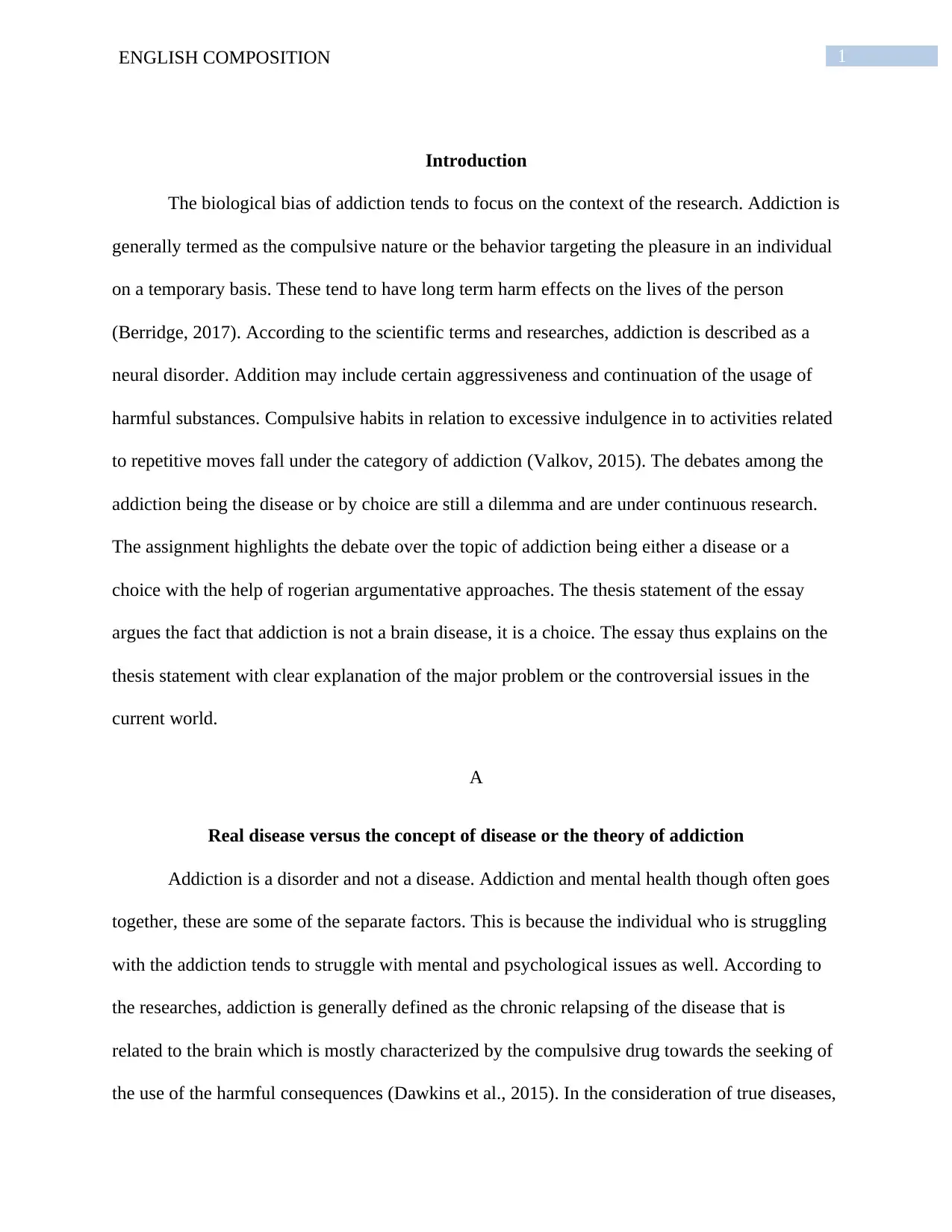
1ENGLISH COMPOSITION
Introduction
The biological bias of addiction tends to focus on the context of the research. Addiction is
generally termed as the compulsive nature or the behavior targeting the pleasure in an individual
on a temporary basis. These tend to have long term harm effects on the lives of the person
(Berridge, 2017). According to the scientific terms and researches, addiction is described as a
neural disorder. Addition may include certain aggressiveness and continuation of the usage of
harmful substances. Compulsive habits in relation to excessive indulgence in to activities related
to repetitive moves fall under the category of addiction (Valkov, 2015). The debates among the
addiction being the disease or by choice are still a dilemma and are under continuous research.
The assignment highlights the debate over the topic of addiction being either a disease or a
choice with the help of rogerian argumentative approaches. The thesis statement of the essay
argues the fact that addiction is not a brain disease, it is a choice. The essay thus explains on the
thesis statement with clear explanation of the major problem or the controversial issues in the
current world.
A
Real disease versus the concept of disease or the theory of addiction
Addiction is a disorder and not a disease. Addiction and mental health though often goes
together, these are some of the separate factors. This is because the individual who is struggling
with the addiction tends to struggle with mental and psychological issues as well. According to
the researches, addiction is generally defined as the chronic relapsing of the disease that is
related to the brain which is mostly characterized by the compulsive drug towards the seeking of
the use of the harmful consequences (Dawkins et al., 2015). In the consideration of true diseases,
Introduction
The biological bias of addiction tends to focus on the context of the research. Addiction is
generally termed as the compulsive nature or the behavior targeting the pleasure in an individual
on a temporary basis. These tend to have long term harm effects on the lives of the person
(Berridge, 2017). According to the scientific terms and researches, addiction is described as a
neural disorder. Addition may include certain aggressiveness and continuation of the usage of
harmful substances. Compulsive habits in relation to excessive indulgence in to activities related
to repetitive moves fall under the category of addiction (Valkov, 2015). The debates among the
addiction being the disease or by choice are still a dilemma and are under continuous research.
The assignment highlights the debate over the topic of addiction being either a disease or a
choice with the help of rogerian argumentative approaches. The thesis statement of the essay
argues the fact that addiction is not a brain disease, it is a choice. The essay thus explains on the
thesis statement with clear explanation of the major problem or the controversial issues in the
current world.
A
Real disease versus the concept of disease or the theory of addiction
Addiction is a disorder and not a disease. Addiction and mental health though often goes
together, these are some of the separate factors. This is because the individual who is struggling
with the addiction tends to struggle with mental and psychological issues as well. According to
the researches, addiction is generally defined as the chronic relapsing of the disease that is
related to the brain which is mostly characterized by the compulsive drug towards the seeking of
the use of the harmful consequences (Dawkins et al., 2015). In the consideration of true diseases,
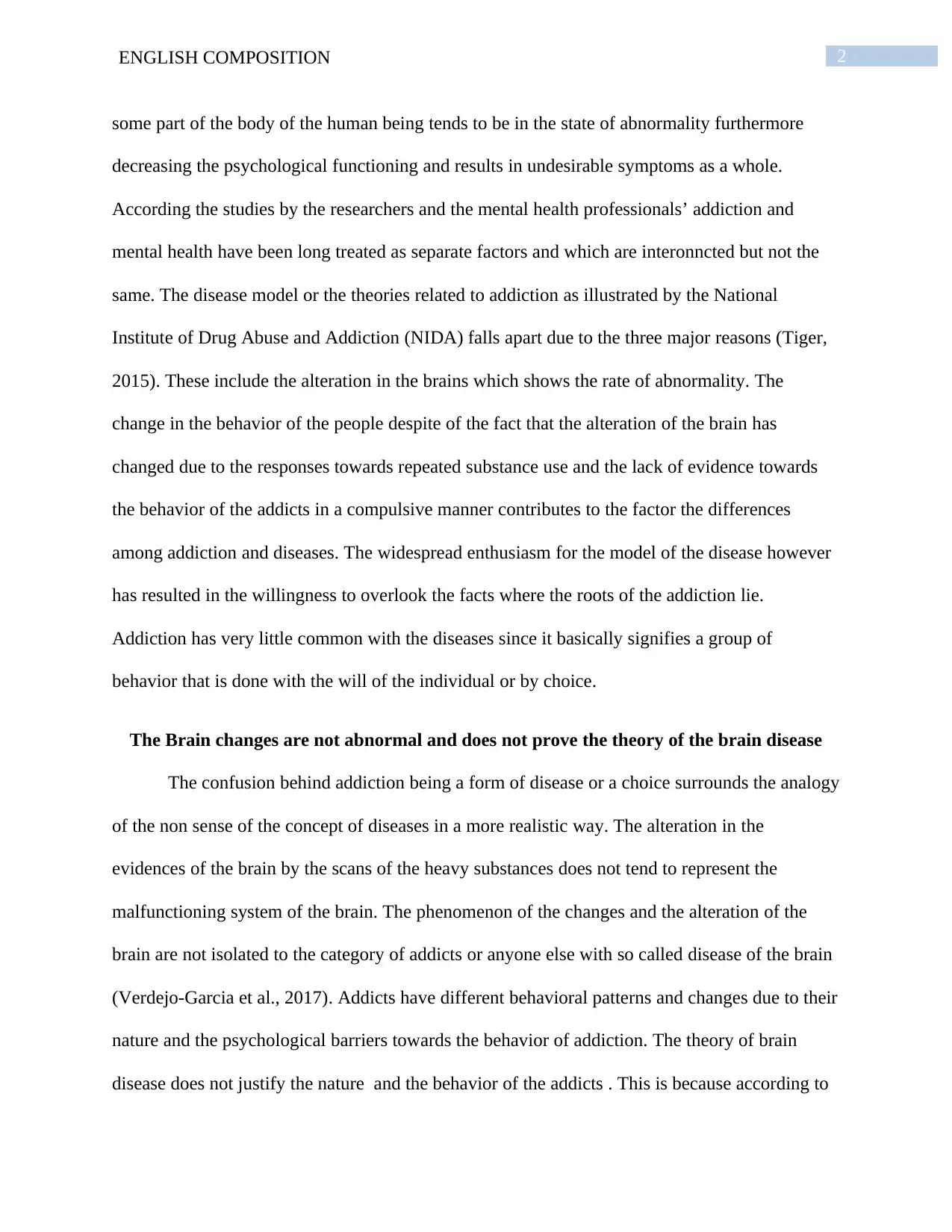
2ENGLISH COMPOSITION
some part of the body of the human being tends to be in the state of abnormality furthermore
decreasing the psychological functioning and results in undesirable symptoms as a whole.
According the studies by the researchers and the mental health professionals’ addiction and
mental health have been long treated as separate factors and which are interonncted but not the
same. The disease model or the theories related to addiction as illustrated by the National
Institute of Drug Abuse and Addiction (NIDA) falls apart due to the three major reasons (Tiger,
2015). These include the alteration in the brains which shows the rate of abnormality. The
change in the behavior of the people despite of the fact that the alteration of the brain has
changed due to the responses towards repeated substance use and the lack of evidence towards
the behavior of the addicts in a compulsive manner contributes to the factor the differences
among addiction and diseases. The widespread enthusiasm for the model of the disease however
has resulted in the willingness to overlook the facts where the roots of the addiction lie.
Addiction has very little common with the diseases since it basically signifies a group of
behavior that is done with the will of the individual or by choice.
The Brain changes are not abnormal and does not prove the theory of the brain disease
The confusion behind addiction being a form of disease or a choice surrounds the analogy
of the non sense of the concept of diseases in a more realistic way. The alteration in the
evidences of the brain by the scans of the heavy substances does not tend to represent the
malfunctioning system of the brain. The phenomenon of the changes and the alteration of the
brain are not isolated to the category of addicts or anyone else with so called disease of the brain
(Verdejo-Garcia et al., 2017). Addicts have different behavioral patterns and changes due to their
nature and the psychological barriers towards the behavior of addiction. The theory of brain
disease does not justify the nature and the behavior of the addicts . This is because according to
some part of the body of the human being tends to be in the state of abnormality furthermore
decreasing the psychological functioning and results in undesirable symptoms as a whole.
According the studies by the researchers and the mental health professionals’ addiction and
mental health have been long treated as separate factors and which are interonncted but not the
same. The disease model or the theories related to addiction as illustrated by the National
Institute of Drug Abuse and Addiction (NIDA) falls apart due to the three major reasons (Tiger,
2015). These include the alteration in the brains which shows the rate of abnormality. The
change in the behavior of the people despite of the fact that the alteration of the brain has
changed due to the responses towards repeated substance use and the lack of evidence towards
the behavior of the addicts in a compulsive manner contributes to the factor the differences
among addiction and diseases. The widespread enthusiasm for the model of the disease however
has resulted in the willingness to overlook the facts where the roots of the addiction lie.
Addiction has very little common with the diseases since it basically signifies a group of
behavior that is done with the will of the individual or by choice.
The Brain changes are not abnormal and does not prove the theory of the brain disease
The confusion behind addiction being a form of disease or a choice surrounds the analogy
of the non sense of the concept of diseases in a more realistic way. The alteration in the
evidences of the brain by the scans of the heavy substances does not tend to represent the
malfunctioning system of the brain. The phenomenon of the changes and the alteration of the
brain are not isolated to the category of addicts or anyone else with so called disease of the brain
(Verdejo-Garcia et al., 2017). Addicts have different behavioral patterns and changes due to their
nature and the psychological barriers towards the behavior of addiction. The theory of brain
disease does not justify the nature and the behavior of the addicts . This is because according to
⊘ This is a preview!⊘
Do you want full access?
Subscribe today to unlock all pages.

Trusted by 1+ million students worldwide
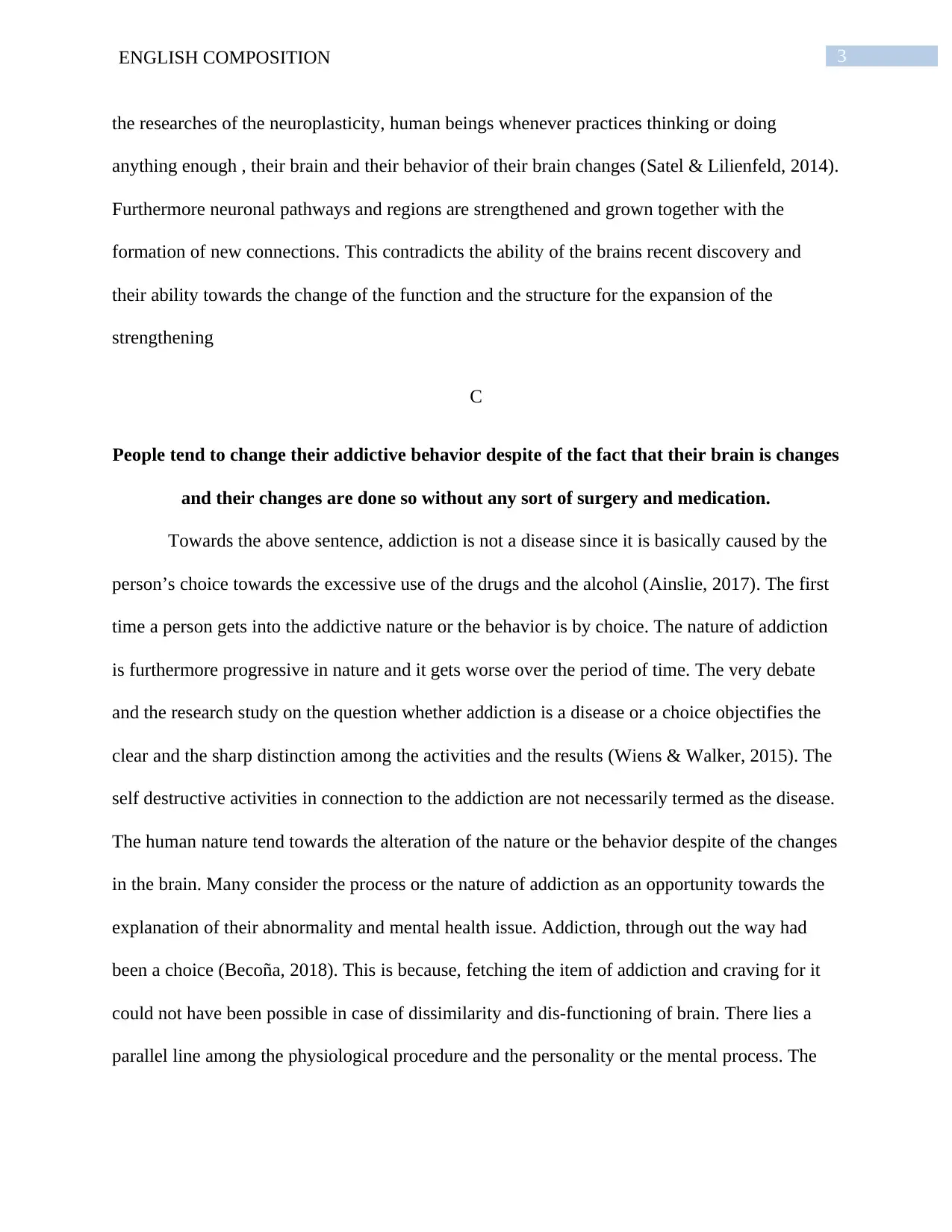
3ENGLISH COMPOSITION
the researches of the neuroplasticity, human beings whenever practices thinking or doing
anything enough , their brain and their behavior of their brain changes (Satel & Lilienfeld, 2014).
Furthermore neuronal pathways and regions are strengthened and grown together with the
formation of new connections. This contradicts the ability of the brains recent discovery and
their ability towards the change of the function and the structure for the expansion of the
strengthening
C
People tend to change their addictive behavior despite of the fact that their brain is changes
and their changes are done so without any sort of surgery and medication.
Towards the above sentence, addiction is not a disease since it is basically caused by the
person’s choice towards the excessive use of the drugs and the alcohol (Ainslie, 2017). The first
time a person gets into the addictive nature or the behavior is by choice. The nature of addiction
is furthermore progressive in nature and it gets worse over the period of time. The very debate
and the research study on the question whether addiction is a disease or a choice objectifies the
clear and the sharp distinction among the activities and the results (Wiens & Walker, 2015). The
self destructive activities in connection to the addiction are not necessarily termed as the disease.
The human nature tend towards the alteration of the nature or the behavior despite of the changes
in the brain. Many consider the process or the nature of addiction as an opportunity towards the
explanation of their abnormality and mental health issue. Addiction, through out the way had
been a choice (Becoña, 2018). This is because, fetching the item of addiction and craving for it
could not have been possible in case of dissimilarity and dis-functioning of brain. There lies a
parallel line among the physiological procedure and the personality or the mental process. The
the researches of the neuroplasticity, human beings whenever practices thinking or doing
anything enough , their brain and their behavior of their brain changes (Satel & Lilienfeld, 2014).
Furthermore neuronal pathways and regions are strengthened and grown together with the
formation of new connections. This contradicts the ability of the brains recent discovery and
their ability towards the change of the function and the structure for the expansion of the
strengthening
C
People tend to change their addictive behavior despite of the fact that their brain is changes
and their changes are done so without any sort of surgery and medication.
Towards the above sentence, addiction is not a disease since it is basically caused by the
person’s choice towards the excessive use of the drugs and the alcohol (Ainslie, 2017). The first
time a person gets into the addictive nature or the behavior is by choice. The nature of addiction
is furthermore progressive in nature and it gets worse over the period of time. The very debate
and the research study on the question whether addiction is a disease or a choice objectifies the
clear and the sharp distinction among the activities and the results (Wiens & Walker, 2015). The
self destructive activities in connection to the addiction are not necessarily termed as the disease.
The human nature tend towards the alteration of the nature or the behavior despite of the changes
in the brain. Many consider the process or the nature of addiction as an opportunity towards the
explanation of their abnormality and mental health issue. Addiction, through out the way had
been a choice (Becoña, 2018). This is because, fetching the item of addiction and craving for it
could not have been possible in case of dissimilarity and dis-functioning of brain. There lies a
parallel line among the physiological procedure and the personality or the mental process. The
Paraphrase This Document
Need a fresh take? Get an instant paraphrase of this document with our AI Paraphraser
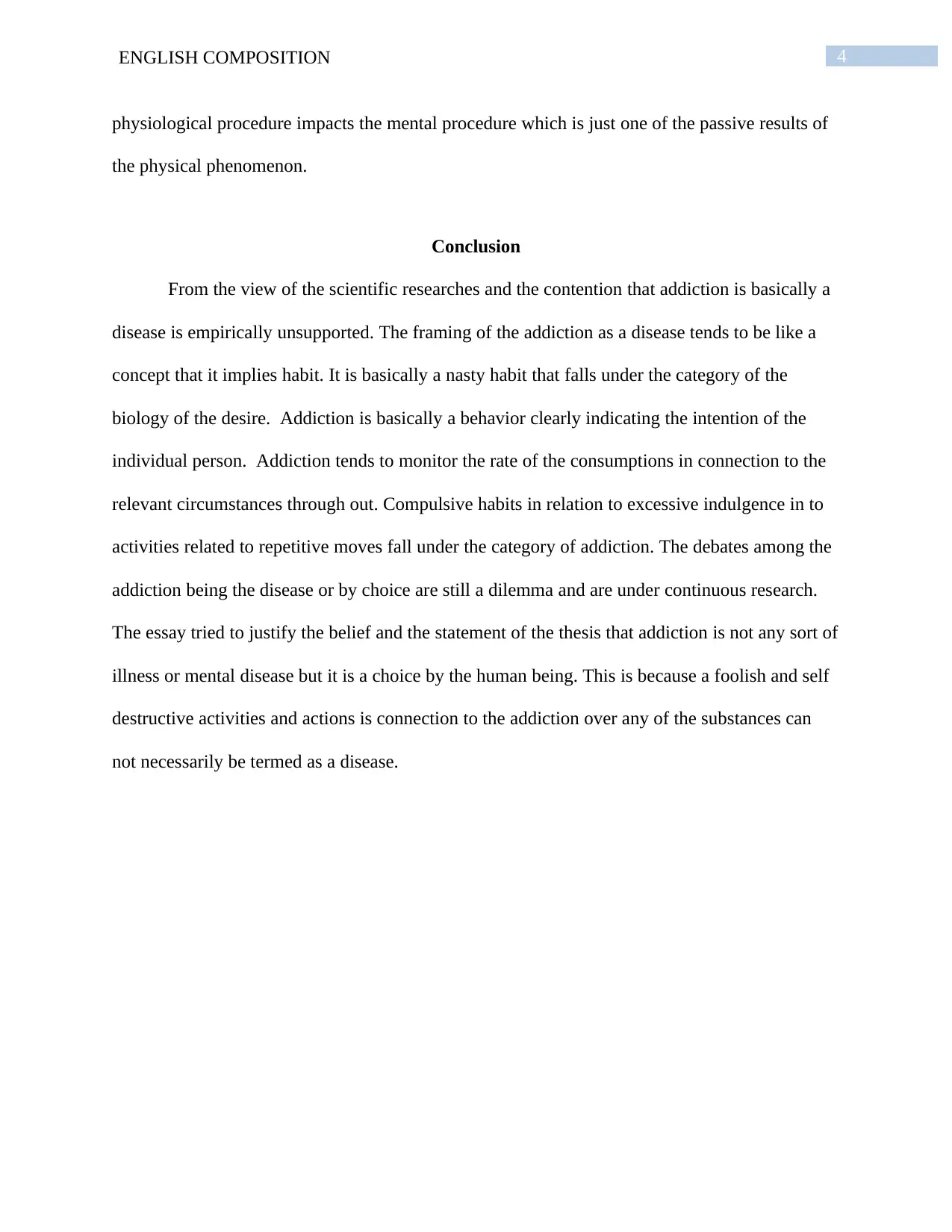
4ENGLISH COMPOSITION
physiological procedure impacts the mental procedure which is just one of the passive results of
the physical phenomenon.
Conclusion
From the view of the scientific researches and the contention that addiction is basically a
disease is empirically unsupported. The framing of the addiction as a disease tends to be like a
concept that it implies habit. It is basically a nasty habit that falls under the category of the
biology of the desire. Addiction is basically a behavior clearly indicating the intention of the
individual person. Addiction tends to monitor the rate of the consumptions in connection to the
relevant circumstances through out. Compulsive habits in relation to excessive indulgence in to
activities related to repetitive moves fall under the category of addiction. The debates among the
addiction being the disease or by choice are still a dilemma and are under continuous research.
The essay tried to justify the belief and the statement of the thesis that addiction is not any sort of
illness or mental disease but it is a choice by the human being. This is because a foolish and self
destructive activities and actions is connection to the addiction over any of the substances can
not necessarily be termed as a disease.
physiological procedure impacts the mental procedure which is just one of the passive results of
the physical phenomenon.
Conclusion
From the view of the scientific researches and the contention that addiction is basically a
disease is empirically unsupported. The framing of the addiction as a disease tends to be like a
concept that it implies habit. It is basically a nasty habit that falls under the category of the
biology of the desire. Addiction is basically a behavior clearly indicating the intention of the
individual person. Addiction tends to monitor the rate of the consumptions in connection to the
relevant circumstances through out. Compulsive habits in relation to excessive indulgence in to
activities related to repetitive moves fall under the category of addiction. The debates among the
addiction being the disease or by choice are still a dilemma and are under continuous research.
The essay tried to justify the belief and the statement of the thesis that addiction is not any sort of
illness or mental disease but it is a choice by the human being. This is because a foolish and self
destructive activities and actions is connection to the addiction over any of the substances can
not necessarily be termed as a disease.
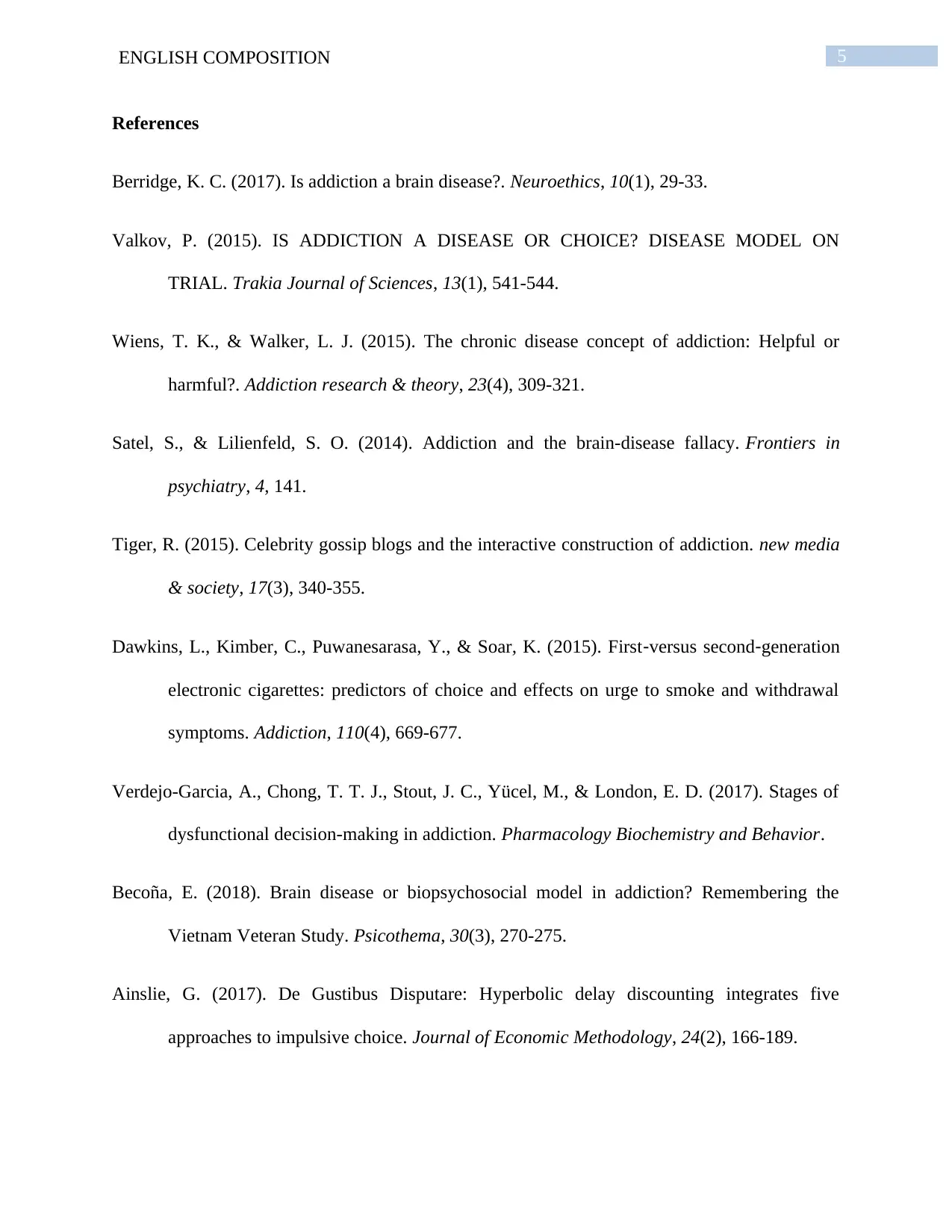
5ENGLISH COMPOSITION
References
Berridge, K. C. (2017). Is addiction a brain disease?. Neuroethics, 10(1), 29-33.
Valkov, P. (2015). IS ADDICTION A DISEASE OR CHOICE? DISEASE MODEL ON
TRIAL. Trakia Journal of Sciences, 13(1), 541-544.
Wiens, T. K., & Walker, L. J. (2015). The chronic disease concept of addiction: Helpful or
harmful?. Addiction research & theory, 23(4), 309-321.
Satel, S., & Lilienfeld, S. O. (2014). Addiction and the brain-disease fallacy. Frontiers in
psychiatry, 4, 141.
Tiger, R. (2015). Celebrity gossip blogs and the interactive construction of addiction. new media
& society, 17(3), 340-355.
Dawkins, L., Kimber, C., Puwanesarasa, Y., & Soar, K. (2015). First‐versus second‐generation
electronic cigarettes: predictors of choice and effects on urge to smoke and withdrawal
symptoms. Addiction, 110(4), 669-677.
Verdejo-Garcia, A., Chong, T. T. J., Stout, J. C., Yücel, M., & London, E. D. (2017). Stages of
dysfunctional decision-making in addiction. Pharmacology Biochemistry and Behavior.
Becoña, E. (2018). Brain disease or biopsychosocial model in addiction? Remembering the
Vietnam Veteran Study. Psicothema, 30(3), 270-275.
Ainslie, G. (2017). De Gustibus Disputare: Hyperbolic delay discounting integrates five
approaches to impulsive choice. Journal of Economic Methodology, 24(2), 166-189.
References
Berridge, K. C. (2017). Is addiction a brain disease?. Neuroethics, 10(1), 29-33.
Valkov, P. (2015). IS ADDICTION A DISEASE OR CHOICE? DISEASE MODEL ON
TRIAL. Trakia Journal of Sciences, 13(1), 541-544.
Wiens, T. K., & Walker, L. J. (2015). The chronic disease concept of addiction: Helpful or
harmful?. Addiction research & theory, 23(4), 309-321.
Satel, S., & Lilienfeld, S. O. (2014). Addiction and the brain-disease fallacy. Frontiers in
psychiatry, 4, 141.
Tiger, R. (2015). Celebrity gossip blogs and the interactive construction of addiction. new media
& society, 17(3), 340-355.
Dawkins, L., Kimber, C., Puwanesarasa, Y., & Soar, K. (2015). First‐versus second‐generation
electronic cigarettes: predictors of choice and effects on urge to smoke and withdrawal
symptoms. Addiction, 110(4), 669-677.
Verdejo-Garcia, A., Chong, T. T. J., Stout, J. C., Yücel, M., & London, E. D. (2017). Stages of
dysfunctional decision-making in addiction. Pharmacology Biochemistry and Behavior.
Becoña, E. (2018). Brain disease or biopsychosocial model in addiction? Remembering the
Vietnam Veteran Study. Psicothema, 30(3), 270-275.
Ainslie, G. (2017). De Gustibus Disputare: Hyperbolic delay discounting integrates five
approaches to impulsive choice. Journal of Economic Methodology, 24(2), 166-189.
⊘ This is a preview!⊘
Do you want full access?
Subscribe today to unlock all pages.

Trusted by 1+ million students worldwide
1 out of 6
Related Documents
Your All-in-One AI-Powered Toolkit for Academic Success.
+13062052269
info@desklib.com
Available 24*7 on WhatsApp / Email
![[object Object]](/_next/static/media/star-bottom.7253800d.svg)
Unlock your academic potential
Copyright © 2020–2025 A2Z Services. All Rights Reserved. Developed and managed by ZUCOL.




